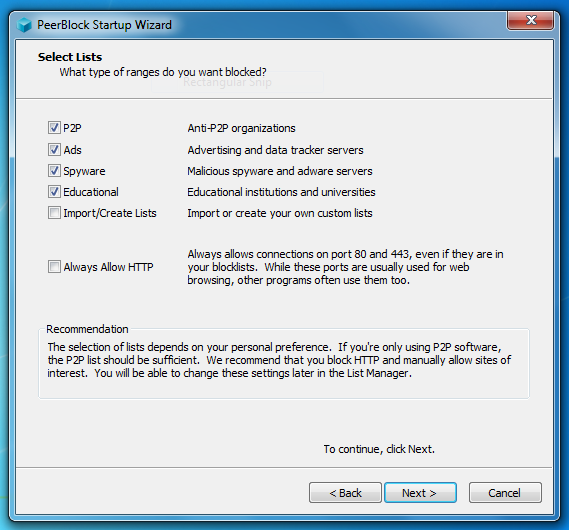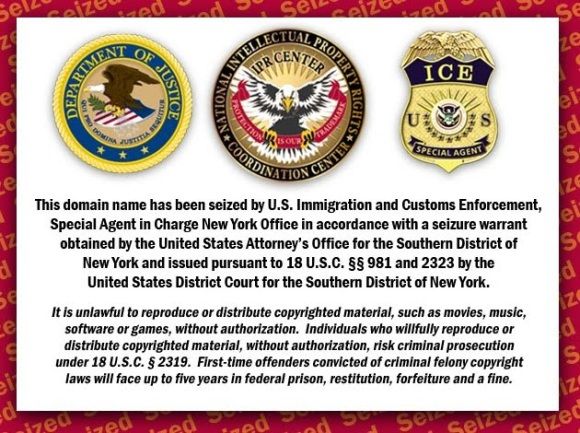I’m not going to judge you. I know you partake in filesharing, and if you’re doing it properly then you’ll already be acquainted with BitTorrent (or Usenet, in which case you’re so "1337" you don’t need my help). Don’t feel bad - studies have suggested that those who download copious amounts of copyrighted data are still contributing to the industry in a big way, some even proposing that this demographic are the industry’s "largest customers".
Regardless of your reasons, stance, operating system or client - there’s no need to get caught. Of course I can’t guarantee this won’t happen, but you can reduce the risk of a threatening letter with a little bit of common sense, patience and forethought.
Install Additional Security
The first thing you’ll want to do is cover as many bases as possible, and this is where PeerBlock comes in. We’ve mentioned PeerGuardian before, but that software is unfortunately no longer maintained. Instead the authors recommend everyone switches to PeerBlock.
PeerBlock is a method of controlling who (and what) your computer talks to over the Internet. The software checks any incoming requests from known bad IP addresses including those of anti-piracy groups. This software will go some way towards protecting you, but only from known threats (which makes it far from watertight).
For that final layer of security then a VPN is the order of the day. By connecting to a virtual private network, all of your Internet traffic (and torrent data downloaded) is directed through a private connection, making it difficult for intruders to spy on you. There are a plethora of various VPN services out there, with clients for nearly every operating system you can think of (that’s right, even your iPhone). We’ve got a run-down of 7 free efforts right here.
Note: Free VPN services are notoriously touch-and-go. If you’re really concerned about security then a subscription service will provide you with the speed, stability and above all security you desire - at a cost of course.
Don’t Use Public Trackers
You’re far more likely to be caught for speeding in a busy, regularly policed area than you are on a quiet country lane - and copyright enforcement is no different. Public BitTorrent sites such as The Pirate Bay and Demonoid (which is virtually public) might be jam-packed with tasty torrents, but at what cost?
So where do you get your wares from? Easy - the smallest, most privacy-savvy trackers you can get into. If you’re a member of any "closed" private trackers, invite-only private trackers or torrent hubs that are clearly going out of their way to avoid detection then use them. If the trackers you use offer advanced privacy settings - e.g. hiding upload/download amounts from the public then use them!
Private trackers are not always safer places to be, and don't assume a tracker is "private" just because you have to register. Some sites ask users to fulfill requests and enforce stringent ratio requirements (that everyone has to adhere to). You can learn more about maintaining private tracker memberships in our etiquette article.
Encrypt Torrent Data
This one is a fairly basic and obvious setting you’ll find on your BitTorrent client - encrypt your data. Many torrent clients support protocol encryption, which encrypts data in a bid to reduce throttling and blocking of torrent data by ISPs. If you’re looking to keep the powers that be off your back then steering clear of confrontations with your ISP is one way of going about it.
Don’t Download Unreleased Material
For some of you this will be the most difficult tip to follow - if next week’s big budget blockbuster release is staring you in the face with thousands of seeds - don’t download it. Where else do you think the MPAA, RIAA and other copyright enforcers hang out, picking off vulnerable targets?
Even if you buy all the things you download once you've sampled the goods - leave it well alone. The "I wouldn’t buy it anyway" defence won’t stand up either and you’ll be lumped with the thousands of other downloaders accused of copyright theft and potentially face a nasty fine and a criminal record.
Put it this way - if you thought downloading copyrighted material was already risky, downloading unreleased movies, music, books and games (especially from public torrent trackers) is outright foolish. You have been warned.
Use A Remote Seedbox
A seedbox is a server with a torrent client that is used for downloading and uploading files. Not only are they incredibly useful for serving private trackers and maintaining a spotless ratio, they also add an extra layer of separation between you and the torrent download.
With Internet connection speeds of 100Mbit or more large files can be downloaded (or uploaded) in record time. You can then connect to your box via your preferred method to collect your payload.
If you’re serious about private sites then a seedbox probably makes a lot of sense. Seedboxes can be rented from various providers online, a quick search will get you where you need to be.
Conclusion
Whilst you’ve been watching what you download, installing a VPN, blocking bad IP addresses and generally securing your box - did you think of checking behind you? Don’t forget that school teachers, parents, siblings or even a spouse might not approve - even if it is just because you’re sucking up all available bandwidth! Be careful out there. If you do receive a nasty notice and are wondering what to do about it then we’ve got an article that might answer a few questions.
How else do you protect yourself? Add a comment in the box below.
Image Credits: Intro (Shutterstock), Infringement Notice (TorrentFreak), Server Room






